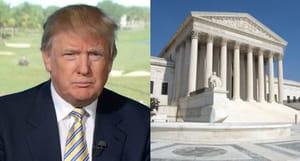
The Department of Justice filed an emergency request with the Supreme Court Tuesday, asking for relief on injunctions for a “public charge” rule which restricts green cards for immigrants overly reliant on the welfare system.
The request comes just days after a federal appeals court declined to lift the injunction. It had originally been imposed by a federal judge in New York this past October.
“The public charge inadmissibility rule enforces long-standing immigration law that Congress reaffirmed in 1996,” a spokesperson for U.S. Citizenship and Immigration Services told Fox News.
“We are confident that an objective judiciary will see that this rule lies squarely within existing law.”
The Trump Administration just took another step towards meaningful immigration reform ⬇️
Federal officials can now deny green cards to immigrants deemed likely to rely on welfare.
This ensures immigrants will not be reliant upon the American taxpayer.pic.twitter.com/r2oHcf1Yi6
— Students For Trump (@TrumpStudents) August 12, 2019
RELATED: Large Majority of Non-Citizens Utilize Welfare Programs
Protecting Benefits For Americans
The Trump administration rule has defined a “public charge” as an immigrant who received one or more welfare benefits over a 12-month period in the past three years.
A ‘fact sheet‘ distributed by the White House in October explains how restricting ‘public charges’ would be beneficial to protecting healthcare benefits for American citizens.
“The Trump Administration has worked to ensure aliens who want to enter or remain in the United States are able to support themselves and not rely on public programs,” it reads.
They also note that the concept of limiting immigrants based on their cost to the benefits system has been a part of immigration law for decades.
“Aliens who receive public benefits above a certain threshold are known as a “public charge,” which has been a ground of inadmissibility for more than 100 years,” the White Hosue contends.
Only now has it become a “racist wealth test,” as legal and immigrant rights groups have argued, because the President’s last name is Trump.
President Trump on ‘public charge’ rule: “I am tired of seeing our taxpayers paying for people to come into the country and immediately go onto welfare and various other things, so I think we are going it right.” https://t.co/SQ9450DjJX pic.twitter.com/LDB5my5rzB
— The Hill (@thehill) August 14, 2019
RELATED: Ocasio-Cortez Proposes Giving Welfare Benefits to Illegal Aliens
Democrats Not Concerned About Benefits For American Citizens
Not exceeding a full year of welfare benefits every three years isn’t exactly a threshold that should be insurmountable for anyone, let alone those seeking a better economic life in another country.
Just last year, the Census Bureau reported that an eye-popping 63 percent of non-citizens were utilizing welfare programs designed to aid Americans struggling financially.
.@CIS_org: 63% of Non-Citizen Households Access Welfare Programs https://t.co/IYe2JLxCh3
— Tom Fitton (@TomFitton) December 3, 2018
Last October, the administration initiated an effort to target for deportation immigrants caught cheating on welfare applications.
While President Trump is busy protecting benefits for American citizens, Democrats like Alexandria Ocasio-Cortez have been working hard to provide welfare to illegal aliens.
Socialist Rep. Alexandria Ocasio-Cortez (D-NY) highlights her plan to give illegal aliens welfare paid for by American taxpayers pic.twitter.com/x8lLQWxrjf
— Ryan Saavedra (@RealSaavedra) October 3, 2019
Ocasio-Cortez introduced an economic policy proposal in October which reads in part:
“Notwithstanding any other provision of law … an individual who is an alien (without regard to the immigration status of that alien) may not be denied any Federal public benefit solely on the basis of the individual’s immigration status.”
Trump, in announcing the “public charge” rule in August, said he is “tired of seeing our taxpayers paying for people to come into the country and immediately go onto welfare.”
The DOJ is requesting the Supreme Court allow the policy to be enforced temporarily until it can be resolved on merits. An order making that decision should be issued in the coming days.
